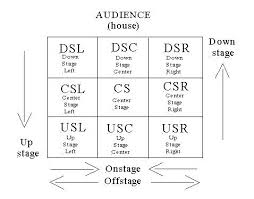There is no easy way to memorize lines. You have to go over and over your lines until you know them cold.
You have to be able to say them automatically without giving them any thought. Like a knee jerk reaction. You hear your cue and – whoosh – the line magically pops out of your mouth.
The first thing to do is understand the play and where the plot goes. You need to know what happens first, what happens next, etc. in order to get a feel for what words happen when. Read and read and read the play until you understand the flow of the story.
If you are lucky, your lines will help move the plot along.
Her: Is she arriving tonight?
You: Yes, I think her car just pulled up.
Your lines might be used to help flesh out a character or a setting. These might be harder to memorize because these lines don’t necessarily “connect” to what’s happening on stage, although they are important to the story.
Him: He’s a bit of a prude.
You: I saw him going into the movie theater yesterday.
Him: He usually stays at home and reads!
Your lines may be there to introduce a song or dance – lucky you, there will probably be some underscoring to cue you in (cue “The RRRain in Spain Stays Main-ly in the Play-hayne”).
There is no easy way to memorize (practice, practice) but everyone has a particular system for making the lines stick:
1. Writing your lives down – may be tedious if you have a big part
2. Talk into a recorder – record your cues and leave a space for your response.
3. Flash cards – with your cues on them; flip them over for your actual line.
4. Cover the line as you are reading them – read your cue, see if you know what your next line is.
5. Work with a partner – he/she must be dedicated to helping you and very patient.
6. Look carefully for clues or signals in your lines or in your cues. One of the most obvious are alphabetical order (or a change in order). “Don’t be silly. Of course you are. You heard what the Master said.” Look for relations between words – similar prefixes or suffixes. Looks for rhymes. Listen for rhythms. Listen for similar sounding words or sounds.
Him: She’s crazy.
You: But she keeps everyone on their toes.
7. Discover the key words in your lines. They may provide guideposts and help you move forward.
These aids will only work after you have put in time to memorize. Begin memorizing as soon as you can in case it takes longer than you anticipate. Read the line, look away, and try to commit the words to memory. Repeat many times. You must focus on engaging the brain for this. No true multi-tasking, although many find it useful to move while memorizing.
If you’ve never had to memorize lines before, you may find this need to focus to be a challenging experience but extremely rewarding for two reasons.
One, focusing will enable you to learn your lines.
Two, focusing will help you during the run of the play. How?
In the real world, we live in a world of distractions. Happily, you can memorize where there are distractions – on the subway, in a library, at the park, while working out. When you focus, you find that your brain no longer recognizes the distractions around you and you only think of the words. And this will serve you well when the time comes for performance. You will have trained your brain to focus. Your focus will be on the actions on stage (and awareness of your audience). When the cell phone goes off, the audience member coughs, or the plane flies overhead, you won’t hear it.
You will be like an athlete making a shot at the foul line in spite of cheering, and jeering, fans.
Don’t try to begin to memorize lines while you are driving. Your focus has to be on the road. Once your lines are memorization, PERHAPS you can recite while driving. But, please, focus on the road for everybody’s safety.
Rehearsing with your fellow actors will help tremendously as you begin to learn your lines. You will move on stage, adding muscle memory to words. You will hear the lines and inflections of other actors which will help you understand where the scene is going. You may have props and items on the set to work with – it will be easier to remember “How fragile this is,” when you’ve just picked up a piece of glass!
You are allowed to be imperfect during the early rehearsal process.
Learn the line exactly as written. It is not OK to paraphrase or ad lib your lines and consider them memorized. You don’t know which of your words your fellow actor is using for their cue – they are expecting to get their cue from you as written.
After you have a good (not perfect) grip on your lines, you can begin developing your character. But first you have to know your lines.
What tricks have you found to help memorize lines? What are some of the problems you’ve come up against?

